How Do You Know
 for sexual content and some strong language.
for sexual content and some strong language.
Reviewed by: Scott Brennan
CONTRIBUTOR
| Moral Rating: | Offensive |
| Moviemaking Quality: |
|
| Primary Audience: | Adults |
| Genre: | Romance Comedy Drama |
| Length: | 1 hr. 56 min. |
| Year of Release: | 2010 |
| USA Release: |
December 17, 2010 (wide—2,500+ theaters) DVD: March 22, 2011 |
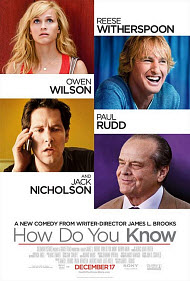

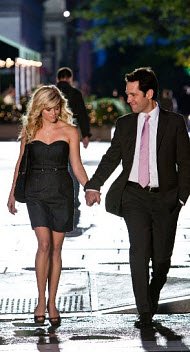


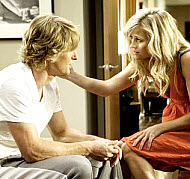
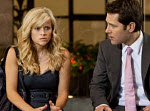
TRUE LOVE—What is true love and how do you know when you have found it? Answer
Should I save sex for marriage? Answer
How can I deal with temptations? Answer
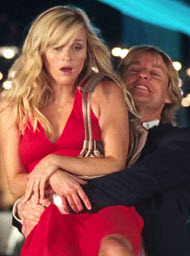
How far is too far? What are the guidelines for dating relationships? Answer
What are the consequences of sexual immorality? Answer
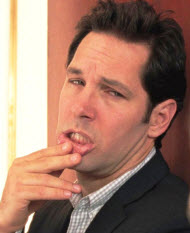
drunkenness in the Bible

Every time you buy a movie ticket or rent a video you are casting a vote telling Hollywood “That’s what I want.” Why does Hollywood continue to promote immoral programming? Are YOU part of the problem? Answer
| Featuring |
|---|
| Reese Witherspoon (Lisa Jorgenson), Jack Nicholson (Charles), Paul Rudd (George), Owen Wilson (Matty/Manny), Andrew Wilson (Relief Pitcher #1), See all » |
| Director |
|
James L. Brooks |
| Producer |
| Columbia Pictures Corporation, Gracie Films, Road Rebel, See all » |
| Distributor |
“She’s in limbo. He’s in love. He’s in trouble. He’s in denial.”
Question: “How Do You Know” when you’ve seen a bad movie?
Answer: You just know. It wasn’t just the nearly empty theater on opening weekend or the lack of audience laughs at all the cutesy lines one comes to expect during this genre of a romantic-comedy-love-triangle. Sadly, this movie just didn’t work. I say sadly, because I expected more from James L. Brooks with “Terms of Endearment,” “As Good As It Gets,” and “Broadcast News” on his past docket.
Unfortunately, this movie doesn’t even reach the pinnacle of a Hallmark or Lifetime film. It is more like the television premiere of a new sitcom. Maybe it was the decades of television writing and directing that overpowered him (and many beloved shows I might add), but not even this Hollywood-big-league-cast (with an extended cameo from Jack Nicholson) can redeem these flat characters or this faltering script. The movie feels dated, contrived, forced and awkward—on so many levels. Don’t get me wrong, there are a few moments, especially near the climax—when real feelings start to surface—but, by then, it is too late.
The final scene with the city buses pulling up to the bus stop at regular intervals—reminds me of the surrealism in the 1991 Albert Brooks movie “Defending Your Life,” where the buses are “heavenly” transports. The only problem is, in this film they are supposed to be “on earth”—a fact which seems to escape James Brooks for the entire film. The movie really does feel like a “back lot set” the entire time. Even though I never actually saw one—I had the perception that a boom microphone was hanging visibly in every other shot, and I fully expected to hear someone yell “cut” at any moment. If only they had.
The storyline
Reese Witherspoon plays a perky professional softball champion named Lisa, who is surprisingly cut from her U.S. team at the age of 31, because she was 0.7 seconds too slow when running to first base. Devastated by this sudden life change, she tries—like a falling cat—to land on her feet, but all her positive post-it notes (taped to her bathroom mirror) aren’t going to help her this time. She attempts, at first, to find comfort in a non-committal relationship with the stud relief pitcher for the Washington Nationals named Matty (Owen Wilson), but each time she comes to bat (pun intended), she senses that something is missing.
Enter stage right, George (Paul Rudd) from “The 40-Year-Old Virgin,” “Knocked Up” and “Role Models”—[I have not seen any of those films]—who in this role plays mister-goodie-two-shoes (I’m guessing a “character departure” from the films I’ve just named above). In the beginning of the film, it appears that George has been shafted by his greedy-corporate-executive father, Charles—played unconvincingly by Jack Nicholson—meaning it is totally implausible that Charles (the way Nicholson plays him) could have reared a son that turned out so “wishy-washy” and sheepishly desirous to be truthful and honest. Talk about pasted together characters. There is absolutely no father-son chemistry here—zilch—nada. So, due to this corporate investigation and a fleet of lawyers, George, like Lisa, finds himself suddenly “cut off” from his livelihood (CEO of one of his father’s companies) as he awaits an investigation by the SEC into his alleged fraud.
During this time of “limbo” for both of them, Lisa agrees to meet George for the first time on sort of a blind date—at a local, upscale, D.C. restaurant. Instantly perceiving his current state of personal devastation, she encourages him to remain silent during dinner and refrain from retelling his calamitous misfortunes for the week. In a trance-like obedience—he does just that—savoring his meal the whole time. During that awkward hush he gets silly-goo-goo-eyed over her dry confidence. She tells him to stop looking at her like “Bambi,” which only increases his infatuation. And so the love triangle begins. Will it be Matty, the self-absorbed hunk who wants a trophy girl but fears commitment, or will it be George, the altruistic, weak-kneed (I might add shallow), love starved knight who secretly believes he can never catch a break? Ho-hum.
Content for concern
Other than the negatives I have already alluded to, in terms of script, two-dimensional characters and disjointed storyline, there are a few points that are of concern when considering this film from a Christian perspective. As to language, there is a scene early in the film where Jack Nicholson reels off three variations of the “f” word back-to-back. There is one use of “Jesus,” five “oh, G*d,” nine “Oh my G*d,” “For G*d’s sakes” (1) and one time where Jack says, “There is a God!” which is about the only truth he ever speaks in the film. There is one reference to male genitals (in slang) and several references to cat feces, using the “s” word (4) to describe them, one use of the term “chicken sh*t,” plus “damn” (4) and “hell” (4).
As to drugs and alcohol, there is a reference to the latter in an elongated scene where George uses Guinness (product placement) and mixed drinks to escape from the painful circumstances of losing his girlfriend and his job in the same week. It’s a production and meant to get laughs, complete with singing into a lampshade alone in his apartment. Not really that funny. Although Lisa is a purported non-drinker in the film, she too succumbs to the pressure and drinks one night at George’s apartment.
There is no nudity (except for female cleavage and shirtless males), but there is a scene with Wilson and Witherspoon in bed together in a morning scene (with pajamas on), and they are casually discussing the sex they had. Another time there are sounds of them having sex, followed by a shot of them immediately afterwards, under the covers, except for the bare chest of Wilson. There is a scene at a party where a guy fondles a woman’s breast from behind (on top of the dress) while they are dancing. There are a couple of references to condom use that also portray a casual attitude toward sex outside of marriage.
Summary
There is a line in the film where Matty says to Lisa, seeing that she is uncomfortable with his rowdy friends at a baseball barbecue party, “There’s some Christian Athletes inside, let’s go eat with them.” It is an odd comment, but very troubling. I guess it is Brook’s attempt to be inclusive by acknowledging the presence of Christians in professional sports, but it somehow came off like we have been relegated to the back of the bus. I long for the films where Christians are portrayed with the strength of character that truly sets them apart from the world (2 Cor. 6:17), not just slightly salty (Matt 5:13) in the other room.
“Figure out what you want and learn to ask for it,” is some advice given during this movie from one character to another and is essentially the theme of the film. We as believers need to figure out what we want from films and learn to ask for it, too. We need to speak with our wallets and stop funding movies of poor taste with our dollars. We must support Christian-themed films, and especially Christian-produced films. Ask God to lead laborers into this tremendous field of potential harvest (Matt 9:38).
Violence: Mild / Profanity: Moderate to Heavy / Sex/Nudity: Moderate to Heavy
See list of Relevant Issues—questions-and-answers.


I thought it would be odd watching her struggle over these two people, but the movie was very well made and pretty clean compared to most the movies out there these days. We really liked it, and it was funny.
Moral rating: Better than Average / Moviemaking quality: 5
Moral rating: Average / Moviemaking quality: 4½
Moral rating: Average / Moviemaking quality: 3
In real life, RW’s character is just a quickly forgotten one night stand for Wilson’s character. Nevertheless, she gets to choose between Wilson and Paul Rudd who is being victimized by the federal government. It is a fantasy picture for women. The idea is that you can make all the wrong choices in life and still have your pick of all the men. It sends an appalling message to young women. I would rather see full frontal married sex in a film, than the glorification of one night stands and womanizing culture that is in this film. The agreeable nature of the characters merely ensures that the poisonous message is not seen for what it is—the primrose path to Hell in this life and the next.
This is a boring film which you should keep your children well away from.
Moral rating: Very Offensive / Moviemaking quality: 2
I watched 75 min. of it and felt terrible, and I turned it off. I should have never even started it.
I was disappointed with Reese Witherspoon in this movie. She goes to Matty’s house one night and has sex with him, and in the morning she gets upset because she finds out he does this with a lot of other females. Lisa (Reese) than comes back and says sorry for leaving and that is not the end of it. This movie has no morals. She moves in with him. … There is lots of drinking, swearing, sex—including sounds, and more immoral things. A true God believing Christian should feel guilty about watching this movie.
I give this movie a 1 out of 10. What a disappointment. I know have to find a funny, clean TV show to watch so I don’t end my night feeling terrible…
Moral rating: Very Offensive / Moviemaking quality: 4
Moral rating: Very Offensive / Moviemaking quality: 1
The romance is too perverted to be sweet, but it’s stupid even apart from that. The original concept was good, but the story development was pathetic. The sex scene is not graphic at all; all you see is the silhouettes of people in bed (they’re in front of a window) and hear groaning, and the guy keeps saying how “AMAZING” her sex is. And these people ain’t married.
Eventually, she ends up moving in with him, which is also prominent. It’s sad that romance movies these days are based on perverted concepts that dumb down holy marriage. Christians will walk away from this movie with a bad mood.
Moral rating: Very Offensive / Moviemaking quality: 1½
The next time she hops into bed with him is shortly after she tells him that he really knows nothing about her and has no idea what she does when she is not with him. While dating this fellow (Owen Wilson) she, also, starts casually dating a 2nd fellow—the movie is very immoral, full of foul language and besides all that wasn’t funny or entertaining. I believe any Christian would be very offended by this movie.
Moral rating: / Moviemaking quality:


My Ratings: Moral rating: Average / Moviemaking quality: 4